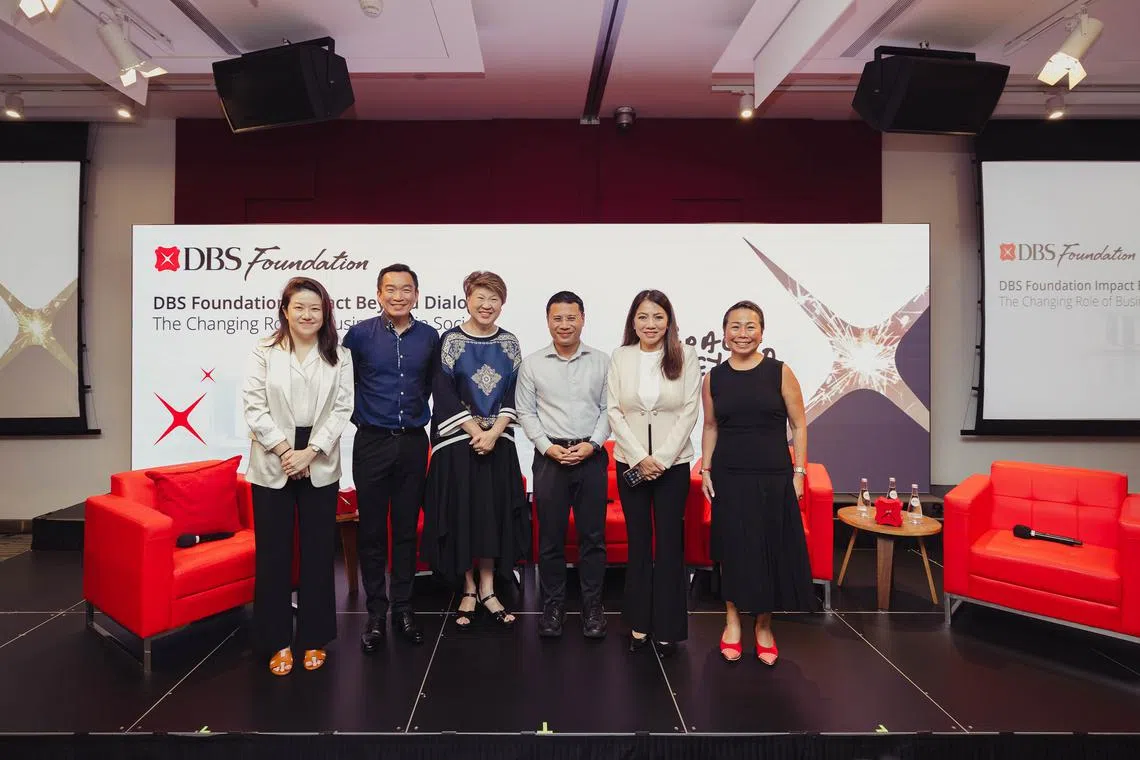Changing the narrative on ageing
DBS Foundation launched the Impact Beyond Award, granting up to S$3 million to businesses with solutions to ageing issues

CHANGING the current narrative on ageing to a positive one.
That was one of the topics raised at the inaugural Impact Beyond Dialogue that was organised by DBS Foundation on Sep 18, with Singapore’s Minister for National Development Desmond Lee as guest of honour.
The event aims to be a platform that brings together business leaders, policymakers and other leading voices to discuss challenges that society is facing.
At the panel discussion, Eric Chua, senior parliamentary secretary for culture, community and youth, as well as for social and family development, said that when referring to the elderly, descriptions that may have negative connotations such as “silver tsunami” are typically used.
“Is anyone truly, really happy to talk about tsunamis?” Chua, who was also guest-of-honour at the event, said.
Hence, when talking about this demographic, “one of the things that can be done is to start (using) positive language as we have more older folks in our population”, he added.
Navigate Asia in
a new global order
Get the insights delivered to your inbox.
Singapore’s population is ageing rapidly, and the Population in Brief 2022 report showed that by 2030, around one in four citizens, or 23.8 per cent, will be 65 years old or above.
The senior parliamentary secretary said that companies therefore need to prepare for an ageing workforce, and think of ways to adapt and tap this group of people who would have more experience.
This comes as a recent study released by the Milken Institute found that the global longevity market is projected to reach about US$600 billion by 2025.

“One of the problems I think businesses deal with today is (manpower issues),” said Chua. He therefore suggested that companies redesign the scope of a job such that it is palatable for seniors – and not discount providing them with opportunities.
Integrating social good into business models may thus become more relevant moving forward, but it will not be without challenges.
As panellist Gillian Tee, co-founder and CEO of care solutions provider Homage, put it: “We don’t know what good looks like. So there is a lack of benchmarking and knowledge-sharing to understand what it truly looks like to do well while doing good. What (does) the economics look like, (and) how do you think about scale?”
Tan Su Shan, deputy CEO and group head of institutional banking at DBS, acknowledged that the “environment” in ESG (environment, social and governance) is easier to track than the social aspect.
“(Environmental impact) is easier as we can track carbon dioxide emissions and there is an empirical glide path.”
Janet Ang, chairman of the Singapore Business Federation Foundation, said at the discussion that seniors should also be willing to have an open mindset and stay relevant. She added that they should be motivated to stay productive, and want to continue being independent and able to provide for others.
She also said that businesses also need to have a culture of inclusiveness and should not view hiring the elderly as a “box-ticking exercise”. “Let’s face it, (hiring that) one person is not going to move the needle. (Companies) must be able to see how (this group) is going to create value, and this means job redesigning will have to happen.”
Putting the spotlight on social issues
At the same event, DBS Foundation also launched a new Impact Beyond Award, to be given to businesses that come up with innovative solutions to significant problems. It is open to social enterprises and SMEs that had at least S$5 million in annual revenue in the most recent financial year.
Each year, a challenge statement will be posed that puts the spotlight on one of society’s pressing needs, and businesses are invited to pitch their ideas.
There is an increasingly critical need to intensify efforts given all the changes and challenges in the world today, one of which is ageing – or rather, longevity – which is what the foundation is focusing on this year, said Karen Ngui, head of DBS Foundation and DBS group strategic marketing and communications.
She added: “The new DBS Foundation Impact Beyond Award seeks to support and scale purpose-driven businesses that are tackling the urgent challenges of an ageing society.
“We are looking for innovative solutions that enhance the quality of life, improve healthcare and nutrition, combat social isolation, build a multigenerational workforce, and ensure financial resilience for the vulnerable. Together, we can build a society that sees ageing populations not as a problem, but as an opportunity to create longevity solutions and do well by doing good.”
The three Impact Beyond awardees will receive prize money of up to S$1 million each, be mentored by the bank’s senior management and other business leaders, and gain access to potential investors.
Ngui said: “At DBS Foundation, we’ve taken steps to develop our own impact measurement approach – this has been integrated across our programmes and initiatives, including our flagship DBS Foundation grant programme. Our framework enables us to see how the programmes will result in the desired social outcomes, both in the short term and long term.
“This allows us and our partners to track and refine efforts, and helps ensure that we’re building towards the right outcomes.”
She added that work with the award winners will involve understanding their respective purposes and business models, aligning on key impact metrics to track, and tailoring DBS’ measurement framework accordingly. One measure of success could include how much impact their solutions can catalyse over different time periods.
The award is part of DBS’ S$1 billion commitment over10 years to uplift vulnerable segments of society.
Decoding Asia newsletter: your guide to navigating Asia in a new global order. Sign up here to get Decoding Asia newsletter. Delivered to your inbox. Free.
Copyright SPH Media. All rights reserved.

